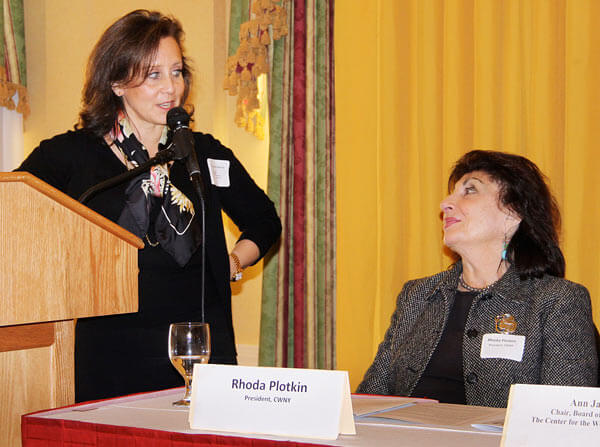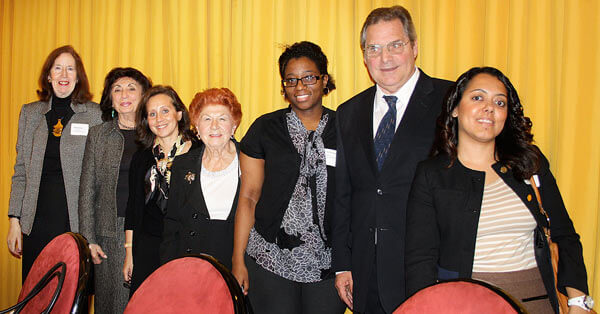By Rich Bockmann
Finding a job and landing one, whether it be white-, blue- or pink-collar, was the topic of discussion Friday at the 24th annual World of Working Women Conference in Flushing.
“This is a horrible economy for everybody. There are just very few jobs out there,” said Ann Jawin, founder of the Center for the Women of New York, which hosted the panel discussion and a job fair afterward at the Sheraton LaGuardia East Hotel. “[The panel is] an opportunity to hear about new careers and an opportunity to hear about the old careers. There’s nothing wrong with the old careers.”
In September, the last month for which the state has data, 87,000 Queens residents were unemployed.
The panel, moderated by TimesLedger Newspapers Editor Roz Liston, discussed the ways women could better market themselves.
City Councilwoman Julissa Ferreras (D-East Elmhurst) said women should highlight one another’s professional rather than personal, strengths when networking.
“We need to promote ourselves better as sisters,” she said, and advised women to practice an “elevator speech” — a one-minute pitch of their value as an employee.
Several of the audience members asked questions about finding a job or switching a career later in life, when their age may be considered detrimental.
Delyanne Barros, an employment-law attorney, said age discrimination, like sexual discrimination, needs to be documented.
“You have to complain in order for the company to be held liable,” she said. “You have to put the company on notice.”
Eric Shtob, senior director of the consortium for worker education, said emerging job markets in green construction and sustainability would provide opportunities for women, who become properly educated and certified, to step outside “pink collar” industries and take jobs normally held by men.
Panelist Darinka Maldonado, director of the Queens Women’s Business Center, said pesticide application licenses are easy to become certified for.
“I understand not many people want to work with roaches or rodents. That’s why these jobs are not very competitive,” she said. “You live in New York, pests aren’t going anywhere.”
Maldonado also encouraged women to start their own businesses, ones that could be passed through generations and create a pattern of financial security early in life.
“Stop answering to another person and answer to yourself. Be the next Oprah in Queens,” she told the hundred or so women and the few men who attended the discussion.
Dr. Christina Matera, a founder of a health and fertility clinic in Manhattan, said the new health care reform law should create higher demand for jobs in the industry as will alternative methods of healing, such as acupuncture and yoga. She warned, though, that many of these jobs are specialized and one should not apply if he or she is not qualified.
“If I advertise for an RN, I’ll get hundreds of medical assistant résumés,” she said. “It’s a waste of your time and expectations.”
Matera said women have focused on their careers at the expense of delaying trying to have children until later in life. Fertility starts to decrease in a woman’s mid-30s, she said, and plummets after 40.
“Although we look good and feel great, our ovaries know our age,” she said.
Advances in the technology of freezing eggs, the doctor said, mean that women do not necessarily have to make the choice between career and family that generations of women before had to.
“[A frozen egg] is a 32-year-old egg, even though a decade has passed,” she said.
Reach reporter Rich Bockmann by e-mail at rbockmann@cnglocal.com or by phone at 718-260-4574.




































